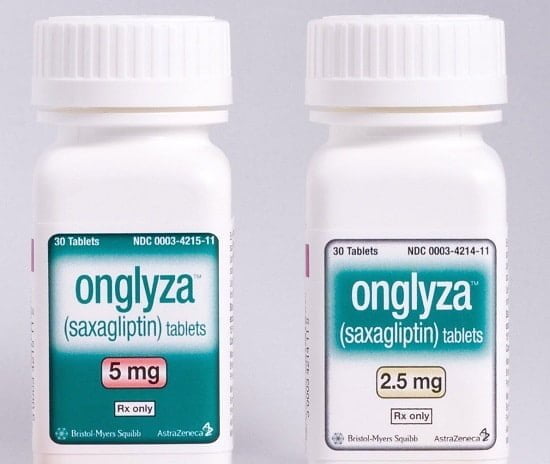Please note: a valid prescription is required for all prescription medication.
Onglyza is a prescription medication used to improve blood sugar control in adults with type 2 diabetes. Its active ingredient, saxagliptin, is a DPP-4 (dipeptidyl peptidase-4) inhibitor that helps regulate blood sugar levels by increasing insulin production and reducing the amount of sugar released by the liver. Onglyza is often used alongside diet, exercise, and other medications to provide comprehensive diabetes care.
Benefits:
- Helps control blood sugar levels in adults with type 2 diabetes.
- Stimulates insulin release in response to meals.
- Reduces glucose production by the liver.
- Can be used with other diabetes medications for better control.
- Does not typically cause weight gain.
Dosage:
- Onglyza is usually taken once daily, with or without food.
- The standard dose is 5 mg daily.
- For individuals with kidney problems, the recommended dose is 2.5 mg daily.
- It is important to take Onglyza at the same time each day to maintain consistent blood sugar control.
Warnings and Precautions:
- Not intended for individuals with type 1 diabetes or diabetic ketoacidosis.
- May increase the risk of pancreatitis; monitor for severe abdominal pain.
- Use cautiously in people with kidney disease; dosage adjustments may be required.
- Onglyza can cause low blood sugar (hypoglycemia) when combined with insulin or sulfonylureas.
- May lead to heart failure in some individuals, particularly those with pre-existing heart conditions.
- Discuss any allergies or current medications with your doctor before starting Onglyza.
Usage Instructions:
- Take Onglyza exactly as prescribed by your healthcare provider.
- Swallow the tablet whole with water.
- Do not crush, split, or chew the tablet.
- If you miss a dose, take it as soon as you remember. If it is close to the next dose, skip the missed dose and continue with your regular schedule.
Storage Information:
- Store Onglyza at room temperature, between 68°F to 77°F (20°C to 25°C).
- Keep it in its original packaging, away from moisture and heat.
- Avoid storing it in areas with excessive humidity, such as bathrooms.
Common Side Effects:
- Upper respiratory infections, such as colds or sinus infections.
- Headaches or dizziness.
- Stomach discomfort or diarrhea.
- Swelling in the hands or feet.
- Allergic reactions, such as rash or hives.
Express Shipping - from $25.00
Shipping with this method takes 3-5 days
Prices:
- Dry-Packed Products $25.00
- Cold-Packed Products $35.00
Standard Shipping - $15.00
Shipping with this method takes 5-10 days
Prices:
- Dry-Packed Products $15.00
- Not available for Cold-Packed products
Can Onglyza be used with other diabetes medications?
Can Onglyza be used with other diabetes medications?
Yes, Onglyza can be combined with other diabetes medications like metformin or insulin to improve blood sugar control. Always follow your healthcare provider’s advice.Does Onglyza cause weight gain?
Does Onglyza cause weight gain?
Onglyza is not associated with significant weight gain, making it a preferred option for some individuals.What should I do if I miss a dose of Onglyza?
What should I do if I miss a dose of Onglyza?
Take the missed dose as soon as you remember. If it is almost time for your next dose, skip the missed dose and continue with your regular schedule.Can Onglyza replace insulin therapy?
Can Onglyza replace insulin therapy?
Onglyza is not a substitute for insulin. It may be used with insulin or other diabetes medications to improve blood sugar control, depending on individual needs.
Rewards Program
Earn points on birthdays, product orders, reviews, friend referrals, and more! Enjoy your medication at unparalleled discounts while reaping rewards for every step you take with us.
You can read more about rewards here.
POINT VALUE
How to earn points
- 1Create an account and start earning.
- 2Earn points every time you shop or perform certain actions.
- 3Redeem points for exclusive discounts.
You Might Also Like
Related Articles
Soliqua Solostar Pen – One Pen, Dual-Action Support
Managing type 2 diabetes can be a complicated journey, especially when your current treatment plan isn’t helping you meet your blood sugar goals. That’s where the Soliqua Solostar Pen comes…
How SGLT2 Inhibitors Are Changing Heart Failure Care
Heart failure is a long-term health condition impacting millions worldwide. It occurs when the heart can’t pump blood efficiently, resulting in symptoms like fatigue, breathlessness, and swelling. Traditionally, treatment has…
Basaglar Cartridge: Long-Acting Insulin for Diabetes
Managing diabetes requires consistent attention, especially when it comes to regulating blood sugar levels. Among the tools used in long-term diabetes care is long-acting insulin, and one notable option is…
Xultophy® Prefilled Pen: Insulin + GLP-1 for Diabetes Care
Managing type 2 diabetes is often a balancing act that involves careful monitoring, lifestyle adjustments, and effective medication. For many patients, finding a treatment that delivers strong blood sugar control…



